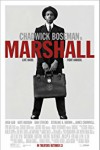A decade before Thurgood Marshall won Brown v. Board of Education, he was an NAACP lawyer popping up into towns around the nation and defending people of color wrongfully accused of crimes. When he came into town, he really did pop with a fearless swagger and a biting humor. At least, that is how director Reginald Hudlin sees him in his film Marshall. Instead of a biographic hero, he becomes something more to us, almost like a comic book hero or a pulp fiction sleuth. It is the best thing about the film, how fact is not played as seriously as creating a mythos for Marshall that inspires us with awe.
Set to a score with jazz riffs and bluesy backgrounds, the film finds itself in the best company when it takes it easy and lets Chadwick Boseman do the talking. He slips into the role with ease, and instead of mustering a thorough likeness to the man, he finds a legend and an idiosyncrasy behind him and takes charge. Any scene Boseman is in positively lights a fire, making this courtroom drama something special. That said, if the story behind the film is told completely accurately, Marshall didn’t get a chance to speak at the trial very much, due to the ruling of the cantankerous judge (James Cromwell). The reasons are suggestive; perhaps because of his race, defending another person of color, Joseph Spell (Sterling K. Brown), or perhaps his practicing out of his state. Either way, the defense would be by Marshall’s hand only, and led by Sam Friedman (Josh Gad). Instead of showing Friedman as a colorful supporting character, Hudlin and his writers bump him up to a co-lead role, one that Gad handles well enough. Simply put, he does not compare to the charisma Boseman’s Marshall has. One wonders how to interpret the co-lead quandary, whether it successfully shows how a pair of good lawyers of different colors and backgrounds found remarkable harmony in their goals, or if it takes away from the fiery, red-blooded spirit behind the man of Marshall. It is up to interpretation. Marshall takes the expectations of the courtroom drama, meets them, and flavors them with style and a coolness, most of which makes the film alive and engaging. Because of some strong language and continual references to rape and violence during the trials, Dove cannot award the film a seal of approval. It is not a family-oriented film, but those with a thirst for social justice that needs to be quenched, or those simply seeking a cool movie, can find that here in Marshall.
Marshall
Dove Review
Dove Rating Details
Faith
Main characters mutually quote scripture and align with God to some capacity
Integrity
In the courtroom, there are several references to rape and violent acts; men intimidate another with a gun; a knife is used as a threat in a flashback; two characters find themselves in fistfights; threats are made to lawyers; mucho of the violence is referenced to or offscreen
Sex
Husbands and wives kiss; a married woman has sex with another man—kissing is seen but nothing too graphic.
Language
Three uses of the F-word; several "God-******" and "Da****"; historical use of the "N" word; "H***"; some slang for male genitalia
Violence
In the courtroom, there are several references to rape and violent acts; men intimidate another with a gun; a knife is used as a threat in a flashback; two characters find themselves in fistfights; threats are made to lawyers; mucho of the violence is referenced to or offscreen
Drugs
Some historical depictions of characters smoking; characters drink several times throughout
Nudity
A man takes off his shorts before having sex.
Other
Race plays a major role, prompting foul language and acts from others; rape is accused several times.




